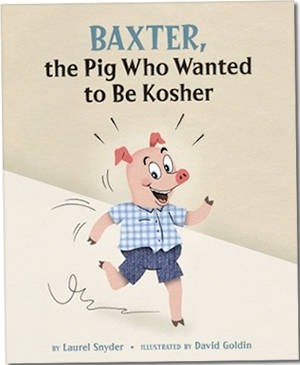BAXTER THE PIG has been a source of fun for children, parents, and bloggers alike since its original publication date of 2010. He has sparked everything from Shabbat discussions to talk of Kosher bacon-flavored food. Arguably, however, his greatest accomplishment has been his embodiment of inclusiveness.
 WHO IS BAXTER?
WHO IS BAXTER?
Baxter is the “lead pig” in the Jewish children’s book, Baxter, the Pig Who Wanted to Be Kosher, written by Laurel Sndyer and illustrated by David Goldin. Upon hearing of the joys and sweetness of Shabbat and, especially, of Shabbat dinner, Baxter sets out to understand what it means to be kosher. His story is one of the well-intentioned exploration of Shabbat.
Baxter is a PJ Library selection going to PJ readers in the Falafel (6–7 Years) Age Group this month (February 2013).
AN INCLUSIVITY PIG
The Jewish community has lauded Baxter, the Pig Who Wanted to Be Kosher for its contributions toward inclusivity. Author Laurel Snyder says, however, the book didn’t necessarily begin with such a noble intent.
“The idea [for Baxter] simply popped into my head one day—a kosher pig! It seemed like a silly idea. A fun idea,” she writes in her Jewish Book Council blogpost, “How Baxter Came to Be.”
“In fact, “ she writes, “it was only once the book was done and actually looked like a book that I was able to read it and recognize it for what it was—a book about inclusion and diversity.”
As Snyder explains further in an interview with Sydney Taylor Book Award Committee past president Barbara Bietz, “At first Baxter was just a goofy pig book. But as the story took shape, I realized that I was writing a book for families that might sometimes feel disconnected from the more traditional Jewish world.” She adds, “Baxter is all about Big Tent Judaism! He's an inclusivity pig.”
In yet another interview, this time with Jewish Woman magazine, in the article “Meet Laurel Synder: Author,” Snyder provides some insight to her connection with Baxter.
“I think I grew up feeling like an outsider in a lot of ways,” Snyder says. “My parents were intermarried, for starters, but also we didn’t live in the Jewish neighborhood, and I didn’t ‘look Jewish’ (I take after my Irishy mom).”
She adds, “In my Jewish world, when I was little (defined largely by my Hebrew school experience), I felt like I stuck out like a sore thumb. Now I know that on some level, we all feel that way.”
ABOUT BAXTER’S AUTHOR
Snyder reveals in her Jewish Book Council guest blogpost, “The Job of Being Jewish,” that she grew up in an interfaith family in New York City. After high school, she went on to study in Tennessee, where she was just one of about 12 Jews in her class.
“By the time I got to Iowa for grad school, my Judaism was something almost entirely inside myself—largely academic,” she writes. “I read Jewish books and watched Jewish movies. I fasted alone on Yom Kippur.”
It wasn’t until Snyder was hired at the Hillel at the University of Iowa that she began to feel “reassured.” It was there that a mentor named Jerry Sorokin (to whom Baxter, the Pig Who Wanted to be Kosher is dedicated) introduced Snyder to “a world of community and support.”
At first, Snyder recalls feeling intimidated by all she didn’t know—“the prayers I couldn’t say and the mistakes I made, by the fact that the students knew more than I did,” she writes. In time however, Snyder learned what she wanted to know. “I learned to keep a kosher kitchen,” she writes. “I studied with Orthodox rabbis. I built a sukkah and lit candles every Friday night.”
It is, perhaps, this growth in Snyder’s life that led her ultimately to conceive of (or, at least, to relate to) Baxter’s character.
In her MyJewishLearning guest blogpost, “Baxter the Pig: The Simple Son,” Snyder summarizes her impression of Baxter. “The thing about Baxter is that he’s clueless, a total outsider, and so he has the advantage of being able to ask any question without feeling bad about himself for not knowing something. Baxter doesn’t feel ashamed of his lack of Hebrew. Why should he?” She points out, “He is the ultimate simple son!”
« BACK TO THE PJ LIBRARY BLOG'S HOME
February 24, 2013